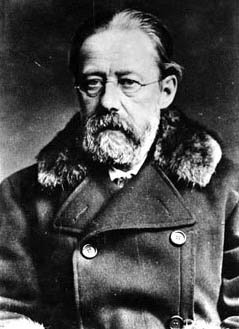Baltimore's Bartered Bride
In a week that has seen or will see new productions of Die Walküre and La Fille du Régiment at Washington National Opera and a Cavalleria Rusticana / I Pagliacci (review this weekend) coming to Fairfax from Virginia Opera, only a crazy person would also go to hear the latest production at Baltimore Opera, too. Well, I admit that I have a weakness for Czech opera, and Bedřich Smetana's Prodaná Nevěsta (The Bartered Bride) is a guilty pleasure worth a trip to Charm City (especially since the only time that the opera was mounted by WNO was in 1994). True, it may be described -- viciously -- as just a step or two above musical theater, but the music and story are light, airy fun, the perfect amuse-gueule before the tragic main course awaiting us next month in Janáček's Jenůfa from Washington National Opera.
 Bedřich Smetana (1824-1884) |
In James McNamara's production for the first-ever performance of this work by Baltimore Opera, the plain, even drab sets (by Rheinhard Heinrich) consist of a wall and houses that expand or contract into the generally barren stage. The entire village is made of the same bland stone, covered with what look like either dead vines or the shadows of unseen trees. The only dash of color in the staging is during the slapstick Act III circus scene, complete with onstage banda, colored lights, flashy costumes, and a dog leaping through hoops. In a clever move, it is also the only time that the Czech language is supplanted by English (and likewise English by Czech in the supertitles, to comic effect), with the Texan twang of the ringmaster (Luke Grooms) and the Baltimore accent ("hon") of the Indian chief (Patrick Toomey). Here is an opera with an actual circus, instead of an opera transformed into a circus, like the American Opera Theater's Acis and Galatea earlier this year.
Tim Smith, BOC presents a lovely 'Bride' (Baltimore Sun, March 26) Sarah Hoover, Wild West Puts Spring In This 'Bride's' Step (Washington Post, March 30) |
The best contribution from Prague was the National Theater's music director, Oliver von Dohnányi, who drove his orchestra and cast through a pleasingly animated performance, almost always keeping them together. The famous overture, with its restless contrapuntal main theme, was at the edge of too fast for the orchestra, who played heroically. The choral scenes had a full and happy sound, especially the famous Beer chorus ("Beer is a gift from heaven" -- yes, indeed!), although the choreography was stilted and unimaginative. Dancers attempted to enliven those scenes, with mixed success, although the music from the orchestra was always pleasing.
Two performances of The Bartered Bride remain, tonight (March 30, 8:15 pm) and Sunday afternoon (April 1, 3 pm), in the Lyric Opera House in Baltimore. Also, Bartered Bride was the first opera to be made into a film (rather than simply filmed on stage), Die Verkaufte Braut, directed by Max Ophüls in 1932, with Jarmila Novotna in the title role.





















































No comments:
Post a Comment